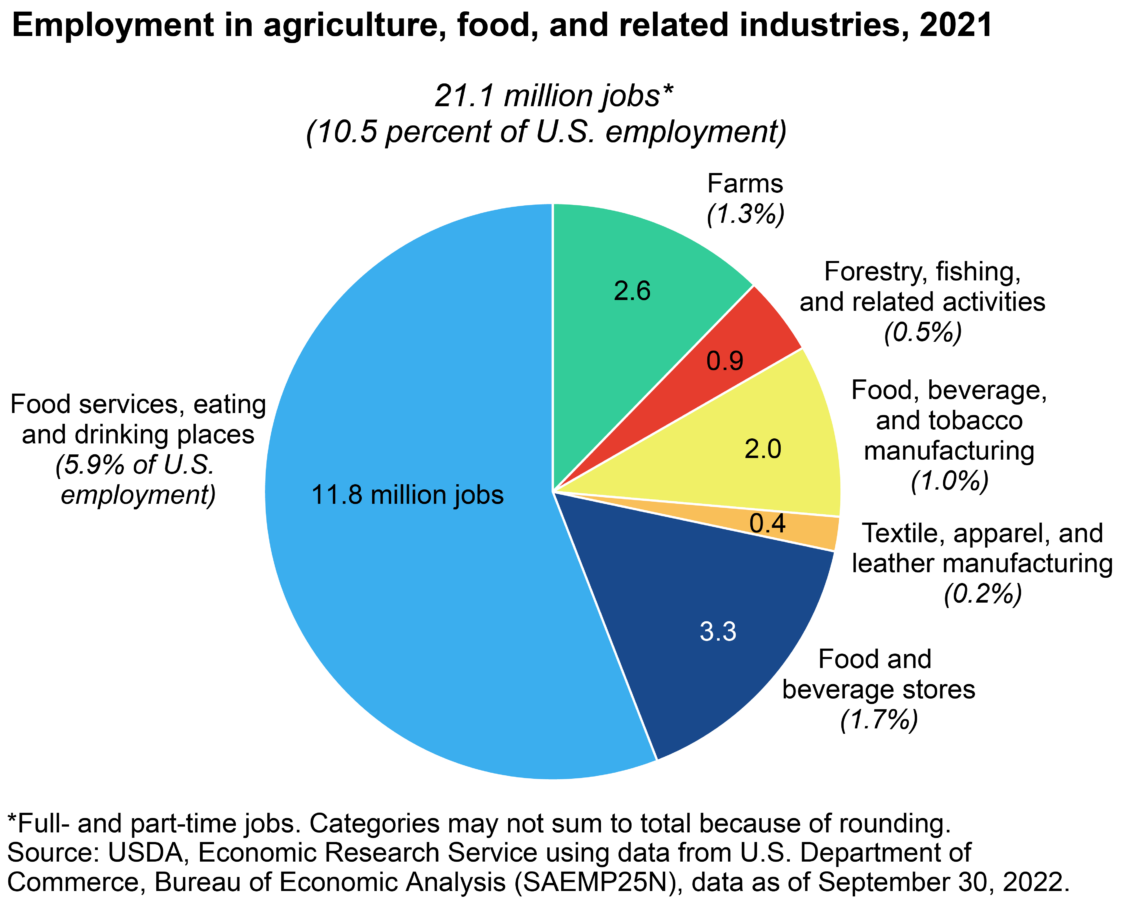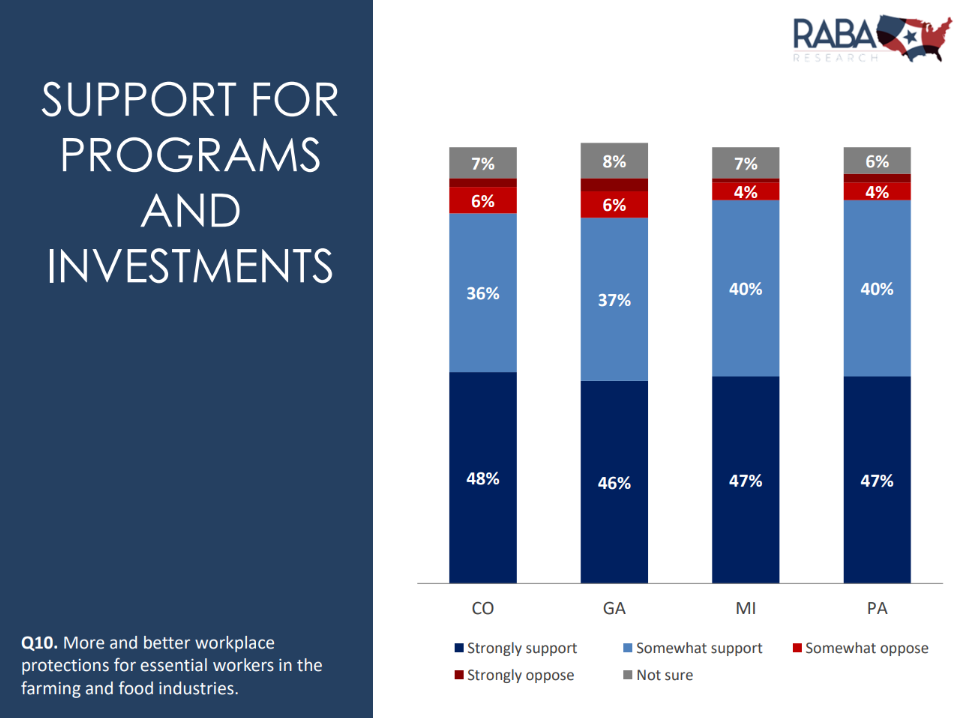The heat wave plaguing the vital agricultural region of California’s Central Valley this past week serves as yet another reminder of the dangers facing farmworkers, who are essential to putting food on all our plates every day. Overall, the last five years have been particularly hazardous for many farmworkers and other workers across the food system, with COVID-19 outbreaks and deaths among workers at Tyson Foods and other meatpacking plants in early 2020, grocery and food delivery workers toiling on the front lines of the pandemic, and farmworkers dealing with suffocating smoke from western wildfires.
Now, as Congress writes the next five-year food and farm bill, workers and their advocates are demanding that the bill do more to help protect and support the people whose labors ensure we can all eat. And new polling commissioned by the Union of Concerned Scientists (UCS) this summer shows that voters—nationally and in a handful of important states—have workers’ backs.
Survey says: don’t let workers continue to struggle
In mid-June and early July, we surveyed nearly 3,000 registered voters nationally and in four key states: Colorado, Georgia, Michigan, and Pennsylvania, all represented by members of the House and Senate committees that are drafting what is usually called the “farm bill.” As I’ve suggested previously, this legislation is more aptly called the food and farm bill because it shapes nearly everything about the system that produces and distributes food in the United States. And yet, although this system is driven by the labor of more than 21 million people, or 10.5 percent of the US workforce, recent farm bills have had little or nothing to say about their working conditions.
 Chart courtesy of the US Department of Agriculture’s Economic Research Service, https://www.ers.usda.gov/data-products/ag-and-food-statistics-charting-the-essentials/ag-and-food-sectors-and-the-economy/
Chart courtesy of the US Department of Agriculture’s Economic Research Service, https://www.ers.usda.gov/data-products/ag-and-food-statistics-charting-the-essentials/ag-and-food-sectors-and-the-economy/So what did our polls show? We asked about a variety of issues relevant to the next food and farm bill, ranging from how to help farmers build climate resilience to how to help people of color, women, and young people succeed in farming (see the full national and state results). Here I’ll focus on the findings related to workers.
- People recognize the hazards faced by food system workers, and they understand that worker health and safety matters for all of us. From the early days of the COVID-19 pandemic, it became clear that when food workers are in danger, we are all in trouble. In our polls, majorities of respondents in the four states—as many as 64% in Georgia and 70% of households that include a farmer—said the risk of illness and injury to essential food and farm industry workers is a threat to communities.
- Overwhelming majorities want a food and farm bill that protects workers. Majorities as large as 87% in Michigan and Pennsylvania and 80% nationally expressed support for more and better workplace protections for essential workers in the farming and food industries. That support held regardless of whether respondents were Republicans (83%) or Democrats (91%), rural (87%), urban (85%), or suburban (85%).
 Graph by RABA Research for the Union of Concerned Scientists, 2023.
Graph by RABA Research for the Union of Concerned Scientists, 2023.- People want Congress to do more to combat hunger. Respondents were also asked about one of the most contentious issues in food and farm bill negotiations: expanding work requirements for the Supplemental Nutrition Assistance Program (SNAP, previously known as food stamps). How is this relevant in a post about working people? Because, perversely, workers in the food and farm sectors have some of the highest rates of food insecurity and SNAP usage, given that these are some of the nation’s worst-paying jobs. Although the program already has work requirements, and evidence shows that most SNAP recipients who can work already do—it’s low wages and unstable hours, not the lack of a job, that make many households food insecure—some House Republicans have called for further expanding work requirements and bogging down recipients with red tape to prove they are employed. In our poll, people across the four states largely reject such action: 41% said Congress should focus more or all of its energy on making sure people have enough to eat, while fewer than a quarter (23%) said Congress should focus more or all of its energy on making sure people receiving food assistance are working.
How legislation can help
During this week smack in the middle of what UCS calls Danger Season (the summer months when multiple impacts of climate change such as flooding, extreme heat, and wildfires overlap), workers from the front lines of our food system will be on Capitol Hill to tell members of Congress and their staffs what the next food and farm bill can do to help. These workers have stories from farm fields where they’ve seen coworkers collapse from heat exhaustion after long days harvesting fruits and vegetables in the hot sun—farmworkers are up to 35 times more likely to die from heat-related illness than workers in general. And they have stories from poultry plants where knife-wielding workers have some of the highest occupational injury rates because of the speed at which they are expected to butcher and pack millions of chickens.
The workers’ stories back up a letter sent to Congress last month by 100+ organizations including UCS detailing 10 things the food and farm bill can do to protect and support food and farm workers. These include funding to help farmworkers prepare for, and recover from, disruptions to the food and farm economy such as pandemics and extreme weather; increased federal investment in public research programs to better understand and reduce risks to farmworker health and safety; and increased protections for meatpacking workers, whose jobs were among the nation’s most dangerous even before the COVID-19 pandemic hit meat and poultry plants hard.
These and other recommendations are all well within the purview of the food and farm bill, and they must be included in the final bill.
Congress should heed the will of the people
With the climate crisis driving dangerous weather across the country this summer, it’s no wonder why people see the need for Congress to take action that protects farmworkers. They can clearly see how big corporations like Tyson Foods and others have hijacked our food system, endangering workers and leaving too many hungry. The answer is a food and farm bill that works for workers—and for all of us.
Is Congress listening?

 1 year ago
58
1 year ago
58


